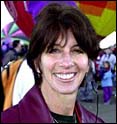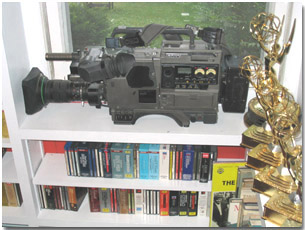"What would you like to drink?" Kaufmann asked, in his 24th floor office overlooking the East River. Kaufmann, one of the nation's leading franchise lawyers, was just back from a day-trip to Pizza Hut in Houston. "Coke, vodka, coffee?" I accepted a Coke, not diet. "You want some gum?" asked Tina, from the cubicle next to the one with my crate. I chomped Bazooka and tabled a Tootsie Roll Pop (cherry) while I busted into the box that held my treasured, worthless camera. A pile of molded silver styrofoam resembling battle armour came out first. I lifted my betacam out of the box. It was heavier than it had been in 1995. It was dirty. I checked every switch, every wheel, dial and meter, most in the same positions as the last day I used them. Like a mother looking for her baby's freckle, I found my label, ABTV, TIJERAS, NEW MEXICO, under the lens, plus a new one: "GOVERNMENT EXHIBIT 2804, CR-95-117-BLG" Near the bottom of the box was the sound mixer, its cables heartbreakingly disarrayed, and what was left of a battered fishpole boom. She's dirty, they're twisted, but home. I went to the Tootsie Pop, and untangled the mess. I unplugged each cable, enjoying the feel of the gear, noting the way they were wrapped and ready October 2, 1995, before their tortious treatment by bandits from Justus Township, as the Freemen called their ranch. The Montana "Freemen" preached white supremacy, wrote fake bank drafts against bizarre liens on the government, and threatened to hang a sheriff's deputy and a judge. They declared themselves sovereign and based their revolt on some constructs they called "Common Law." Before law enforcement closed in on their log home in Roundup they convoyed to Brusett, Montana, to a farm that had been repossessed after they ran up more debt than they could pay. I was waved onto that ranch by one of the Freemen and into an ambush, along with my partner Hal Bowers and associate producer Allison Sesnon, on assignment for Prime Time Live, a news magazine program of ABC News. I heard the CLICK-CLICK while I struggled against a guy with his hands on my camera. I assumed he would cover the lens with his hand, to keep me from shooting. I dug in and hung on hard while I rolled. No way was I letting go of my camera. CLICK-CLICK, they chambered their rounds. "Okay, okay, OKAY," said Allison. I let go of the camera. It was still rolling, panning my startled self, carcoat pulled off my shoulder and an array of Freemen pointing rifles at us. One Freeman put his piggy face in my face. Flat pale eyes and downturned mouth. "If you want your equipment back, you can come to the Supreme Court in thirty days," he said. Supreme court? What Supreme Court? "Yes sir," I said. The pig guy, gun in his holster, wore a sheriff's badge from "Justus Township" on his hunter's jacket. "A Tinkertown badge," I thought. Without my camera, I didn't know what to do. Hostage. Thirty days in eastern Montana. What supreme court? That little cabin over there? What thirty days? To my left, a kid in cammies pointed an M16, or something like it, at me and Hal who stood motionless without the audio mixer and boom they took from him, his neckstrap adrift on his shoulder. To the right was a skinny guy in hunter's clothes, shotgun lowered to his hip. "It looks like my gun," I thought. I kept a Remington pump, 10 gauge, at home. I backed up a little and felt something behind me. I hoped to God it was the rear view mirror, not another gun. The Pig guy took control. I started to breathe. "Get out of here," he said. Not hostages, only robbed and run off the ranch. Not shot. "Okay, okay, okay," Allison was still saying, as we climbed in the cherry red Winstar. We always parked like newspukes, facing out, even at our friends homes. Hal threw the rental van in gear and drove like hell. "Is everybody okay?" I asked. "Did you wet your pants?" Triumph of the bladder, thrill to be alive. Terror they would drive us off the road. "Are they still behind us?" Harry Phillips, the producer who sent us there, was watching tv in his office in L.A., reassigned by Prime Time to wait out the OJ Simpson verdict. "I wish I had been there," he said later. "It was my shoot." After they ran us out of town, the Freemen displayed my camera on their trophy shelf. Investigative producer JW August at KGTV, the ABC affiliate in San Diego, obtained footage of one of the Freemen bragging how easy it was to take the camera from me, and how I had said, "yes, sir" to him. (It's true. With a loaded gun pointed at me, it was, and I did.) After the robbery, I concluded my employers literally didn't care whether I lived or died, but I continued to work for them. The producer of Prime Time never called, the executive producer never said or wrote a word to me. I bought a new camera and had the name "Beauty" painted on its side. I'd shot so many ugly things in 20 years of television, I wanted to remember to find the beautiful. In March of 1996, the Freemen robbed another freelance cameraman, David Fox, who was shooting for NBC News. Wanted for armed robbery and bank fraud, they held Federal Bureau of Investigation agents at bay for 81 days. One week after the F.B.I. cut their electric power, the Freemen surrendered. The robbers apparently hadn't figured out how to eject the tape after the battery died, and surrendered my camera with the video evidence still inside. The day the Freemen gave up, I decided I didn't want to be a camerawoman any more. I sold my new camera and stared at the sky. My partner Hal Bowers, who had tech'd my audio for 16 years, maintained the equipment, and fathered our two children, got out of our marriage, and got out of the business. I stayed in, as a field producer, or, when I needed the benefits, as the production manager at a Univision station. We identified our stolen equipment, held by the FBI, and assisted the Justice Department with their prosecutions. Hal testified in one hearing and two trials in Billings, Montana. The last day of testimony, he was told he was not longer covered by the Witness Protection Act. "You're on your own now," an agent told him, with a pat on the back. Nine Freemen were convicted. My camera equipment was held in evidence by the Montana Department of Justice until the convictions were appealed and upheld October 12, 2002, seven years and ten days after the ambush. I phoned and emailed the US Attorney for the next six
months, without getting my equipment, until David Kaufmann helped me
communicate with the Montana Department of Justice, who instructed the
FBI to send my antiquated camera home.
David Kauffman asked a young man in his office to bring a dolly and help me with the gear. "Thankyou, but I'm okay," I told the guy. "I'll wear it." I slung the camera over my shoulder, and got in the elevator. It stopped on the 20th floor where a well-suited man stepped in. "Did you get a good story?" he asked, eyeing the gear. "Yeah, it's a great story," I said, squeezing the strap and snugging the camera to my side, "but you'd never believe it." © AMY BOWERS |
|
|
Write a Letter
to the Editor |

